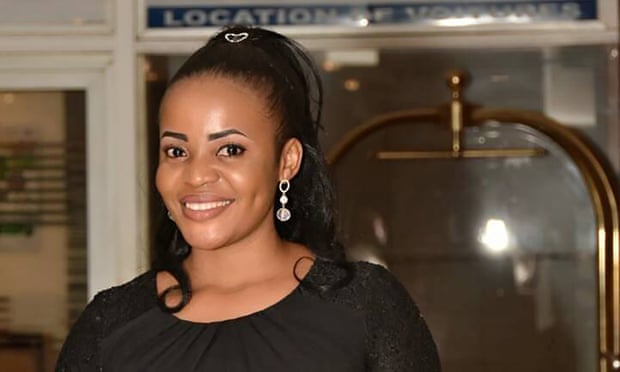Australia denies Mimi Mefo visa for press freedom conference
A Berlin-based journalist who was due to speak at a press freedom conference in Brisbane has said she was denied a visa by the Australian government because they believed she might try to stay.
Mimi Mefo, an award-winning Cameroonian journalist who currently works for Deutsche Welle, was scheduled to deliver a keynote address at the Integrity 20 conference on Friday.
However, last week her visa was refused because immigration authorities “were not satisfied that the applicant’s employment and financial situation provide an incentive to return”, Integrity 20 said.
Mefo, who won the 2019 Index on Censorship freedom of expression award for journalism, was due to travel on from Australia to South Africa to deliver a lecture at the African investigative journalism conference.
She said her flights were already paid to connect her from Brisbane to Johannesburg.
“For some insane reason, [Australian ambassador to Germany, Lynette Wood’s] team think that Australia is heaven where I will abandon my job in Germany, disappoint everyone at the #AIJC in South Africa, just to remain there illegally,” Mefo said on Twitter.
“I guess there are many ways to attempt silencing journalists.”
Australia’s Department of Home Affairs said it did not comment on individual cases.
A spokesman said visa decisions were made “only after full and careful consideration of the information provided by the applicant and any other relevant information held by the department, and in accordance with Australia’s migration legislation”.
“The decision-maker must be satisfied that health, character, security and genuine temporary entry and stay requirements are met in order to grant a visa.”
Jodie Ginsberg, the chief executive of Index of Censorship, said the idea that Mefo would jeopardise a two-year contract with Deutsche Welle to seek asylum was “obviously nonsense”.
“Is it conspiracy or cock-up? I suspect they didn’t perhaps take into account all the documentation which demonstrates her achievements and the fact she was going straight on to her talk in South Africa,” Ginsberg said.
“If that’s the case it means many journalists or dissidents will find they aren’t able to enter Australia.”
Australian journalist and chair of the Walkley Foundation, Kerry O’Brien, who will also speak at Integrity 20, said Mefo was a highly respected journalist who had been jailed for truthful reporting in Cameroon and awarded for her journalism.
In 2018 Mefo spent four days in jail for reporting allegations of military involvement in the death of a US missionary. She was released after international pressure.
O’Brien told Guardian Australia he didn’t understand why the government would think she represented a risk of overstaying her visa.
“I think it is a very sad irony that the government would decide to stop Mimi from coming into Australia to participate in a serious forum in a discussion on the importance of a free press and freedom from censorship,” O’Brien said.
“Given the ongoing debate and concern in this country about police raids on journalists and journalism organisations, I would think the government would want to demonstrate that when it says it supports a free press that it actually does, because this incident says otherwise.”
The Media, Entertainment and Arts Alliance (MEAA), which represents journalists, said it had written to the immigration minister, David Coleman, urging him to intervene, and endorsed a statement from Index on Censorship: “Australia prides itself on its democratic values, including freedom of expression. This means it needs to support and champion those being denied the right to speak in their own countries. Denying visas to journalists who have faced oppression and censorship in their own countries simply emboldens the oppressor.”
Integrity 20 said it was “deeply disappointed” by the visa refusal, which “denied the opportunity for Australians to hear from this significant international voice.
While there was now no chance of Mefo getting to the conference even if her visa was granted, Ginsberg said the refusal “cannot be allowed to become a pattern”.
“It’s absolutely essential, even in the age of the internet, that individuals are allowed to travel and people have the opportunity to hear from them in person. That’s a fundamentally different experience which has the potential to change people’s viewpoint.
“Preventing Mimi from travelling helps to strengthen oppressive regimes around the world; it’s another way to silence [journalists and dissidents].”
The refusal of Mefo’s entry comes amid a nationwide press freedom campaign by Australian media outlets addressing increasing government encroachment on journalists. It has largely focused on federal police raids on the homes and offices of journalists from News Corp and the ABC.
Ginsberg said the irony was that the conference’s panel on press freedom, which she will still appear on without Mefo, would now focus more on the Australian government’s poor track record than the global problem.
Source: The Guardian





